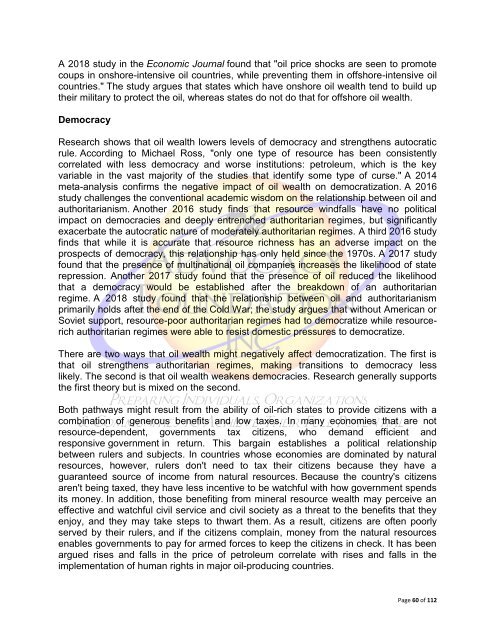De-Industrialization
De-Industrialization
De-Industrialization
Create successful ePaper yourself
Turn your PDF publications into a flip-book with our unique Google optimized e-Paper software.
A 2018 study in the Economic Journal found that "oil price shocks are seen to promote<br />
coups in onshore-intensive oil countries, while preventing them in offshore-intensive oil<br />
countries." The study argues that states which have onshore oil wealth tend to build up<br />
their military to protect the oil, whereas states do not do that for offshore oil wealth.<br />
<strong>De</strong>mocracy<br />
Research shows that oil wealth lowers levels of democracy and strengthens autocratic<br />
rule. According to Michael Ross, "only one type of resource has been consistently<br />
correlated with less democracy and worse institutions: petroleum, which is the key<br />
variable in the vast majority of the studies that identify some type of curse." A 2014<br />
meta-analysis confirms the negative impact of oil wealth on democratization. A 2016<br />
study challenges the conventional academic wisdom on the relationship between oil and<br />
authoritarianism. Another 2016 study finds that resource windfalls have no political<br />
impact on democracies and deeply entrenched authoritarian regimes, but significantly<br />
exacerbate the autocratic nature of moderately authoritarian regimes. A third 2016 study<br />
finds that while it is accurate that resource richness has an adverse impact on the<br />
prospects of democracy, this relationship has only held since the 1970s. A 2017 study<br />
found that the presence of multinational oil companies increases the likelihood of state<br />
repression. Another 2017 study found that the presence of oil reduced the likelihood<br />
that a democracy would be established after the breakdown of an authoritarian<br />
regime. A 2018 study found that the relationship between oil and authoritarianism<br />
primarily holds after the end of the Cold War; the study argues that without American or<br />
Soviet support, resource-poor authoritarian regimes had to democratize while resourcerich<br />
authoritarian regimes were able to resist domestic pressures to democratize.<br />
There are two ways that oil wealth might negatively affect democratization. The first is<br />
that oil strengthens authoritarian regimes, making transitions to democracy less<br />
likely. The second is that oil wealth weakens democracies. Research generally supports<br />
the first theory but is mixed on the second.<br />
Both pathways might result from the ability of oil-rich states to provide citizens with a<br />
combination of generous benefits and low taxes. In many economies that are not<br />
resource-dependent, governments tax citizens, who demand efficient and<br />
responsive government in return. This bargain establishes a political relationship<br />
between rulers and subjects. In countries whose economies are dominated by natural<br />
resources, however, rulers don't need to tax their citizens because they have a<br />
guaranteed source of income from natural resources. Because the country's citizens<br />
aren't being taxed, they have less incentive to be watchful with how government spends<br />
its money. In addition, those benefiting from mineral resource wealth may perceive an<br />
effective and watchful civil service and civil society as a threat to the benefits that they<br />
enjoy, and they may take steps to thwart them. As a result, citizens are often poorly<br />
served by their rulers, and if the citizens complain, money from the natural resources<br />
enables governments to pay for armed forces to keep the citizens in check. It has been<br />
argued rises and falls in the price of petroleum correlate with rises and falls in the<br />
implementation of human rights in major oil-producing countries.<br />
Page 60 of 112

















